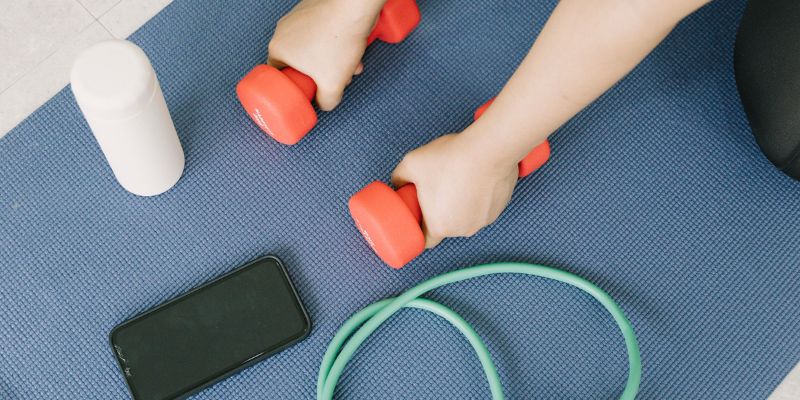Is It Safe to Work Out While You're Fasting: All you Need to Know
Oct 09, 2024 By Alison Perry
Many people now fast, particularly with intermittent fasting, which has become somewhat famous. One prevalent debate, though, is whether it is safe to work out on a fast. People fast for weight control, health, or religious purposes, among other things. Although fasting has several advantages, it also begs questions regarding exercise safety. While some worry it may damage the body, others believe fasting increases the efficacy of exercise.
Since everyone reacts differently, knowing how your body handles fasting is imperative. Exercise stresses the body; hence, it would seem dangerous to perform without eating. However, some research indicates that exercising while fasting may have advantages like enhanced endurance and fat burning. This guide will discuss whether working out while fasting is safe, the advantages and drawbacks, and pointers for doing it properly.

How Fasting Affects the Body?
Fasting causes your body to change in various ways. Your body runs on glucose from food for energy following meals. Your glucose levels decrease several hours after not eating. Your body starts burning stored fat for compensation. One name for this process is fat oxidation.
While fasting, your insulin levels drop, and your body becomes more adept at burning fat. Some people fast to lose weight or boost metabolic function. Still, fasting influences your energy, hydration, and general strength. Workouts seem more difficult than usual since your body can lack the fuel required to maintain lengthy or vigorous physical activity.
Benefits of Exercise While Fasting
Here are some advantages of exercising out during a fast that you could find useful:
Increased Fat Burning
Burning more fat is one of the key motivations behind people working out during a fast. When you haven't eaten, your body shifts to stored fat for energy. For individuals trying to shed weight, fasting becomes an interesting choice. Research indicates that fasted-state exercise can boost fat loss over time and raise fat oxidation.
Improved Insulin Sensitivity
Working out during a fast could also raise insulin sensitivity. Your body thus becomes more efficient at using insulin to reduce blood sugar levels. Conditions like type 2 diabetes cannot be prevented without improved insulin sensitivity.
Endurance Training
Some sportsmen discover that fasting helps them to increase their endurance. It is so because the body develops to be more effective at burning fat as fuel during extended lengths of activity. It can let athletes perform better over time in endurance events like cycling or running.
Mental Clarity and Focus
Sometimes fasting helps one get more mental clarity and focus. Some folks find they become more aware during their exercises without the diversion of meal digestion. It can help with motivation and focus, particularly in light or moderate-intensity activities.

Risks of Working Out While Fasting
Here are several hazards of exercising out during a fast that you should know about:
Low Energy Levels
Low energy is the most clear risk of working out on a fast. Carbohydrates are quick fuel your body needs for high-intensity activities; hence, skipping meals causes your body to run out of food. Without this nourishment, you may feel tired, slow, or weak during exercise.
Muscle Loss
Your body may burn muscle and fat for fuel during a fast. It worries during extended fasting or high-intensity training. Losing muscle mass might reduce your metabolic rate and make maintaining strength over time more difficult.
Dehydration
Fasting might cause dehydration, particularly if you're not drinking enough fluids. Water is essential for maintaining vitality, physical ability, and general well-being. Natural exercise causes sweating; hence, you may get dehydrated if you fast and do not consume enough water.
Impaired Performance
If you work out hungry, your performance in high-intensity exercises could suffer. Activities requiring bursts of energysuch as running, weightlifting, or HIITrely mostly on carbs for sustenance. Your body may struggle to function at its finest if it runs without this gasoline. Reduced performance over time could compromise your general improvement in fitness.
Tips for Working Out Safely While Fasting
Here are some guidelines to enable you to try working out during fasting safely:
- Start Slow: If you have never fasted, start with low-intensity exercises like yoga or walking. As your body responds, progressively raise the intensity.
- Hydrate: Consume plenty of water to avoid dehydration before, during, and following exercise. It also helps to keep electrolyte drinks free of calories.
- Listen to Your Body: Take note of your feelings. Stop the exercise if you feel lightheaded, queasy, or tired; then consider eating.
- Choose the Right Time: One could consider working out at the end of your fasting period. You can thus recharge with a meal straight after your exercise.
- Focus on Low-Intensity Workouts: Usually, low-intensity exercise is safer during fasting. These workouts can still be useful for burning fat without taxing your body.
Who Should Avoid Working Out While Fasting?
Not everyone enjoys fasting and exercise. Some groups should be careful or avoid working out completely while fasting:
- Pregnant Or Breastfeeding Women: Because they require more energy and nutrients, pregnant or nursing women should not fast or do vigorous exercise.
- People With Underlying Health Conditions: Before fasting and working out, those with underlying medical illnesses, including diabetes, heart disease, or eating problems, should see a doctor.
- Individuals Prone To Dizziness Or Fainting: Those who experience vertigo or fainting may find Working out while fasting for 72 hours too dangerous.
- Athletes Focused On Building Muscle Mass: Athletes aiming at increasing muscle mass should exercise caution since fasting can cause muscle loss, especially in high-intensity training.
Conclusion:
When to workout during intermittent fasting, some people find it safe to work and exercise, yet it is not for everyone. While some might find the advantages of higher fat burning and mental clarity appealing, others might suffer low energy, dehydration, or poor performance.
If you're new to fasting, pay close attention to your body and begin with low-intensity workouts. Keep yourself always hydrated; think about exercising exercise after your fasting window to replenish afterward. Whether working out while fasting is safe will ultimately rely on your physique, fitness objectives, and exercise experience.

How to Run Faster and Longer: 4 Effective Running Workouts for Speed and Endurance

Exploring the Effectiveness of Home Remedies for Skin Cleansing

Serving up healthy, high quality and local food in Victorian public hospitals and aged care facilities

Is It Safe to Work Out While You're Fasting: All you Need to Know

Bleeding Nose? Practical Tips for Immediate Relief and Prevention

Exploring the Power of Tea Tree Oil for Acne Relief: Benefits and Tips

Is Sunflower Oil Really Beneficial for Your Health?


